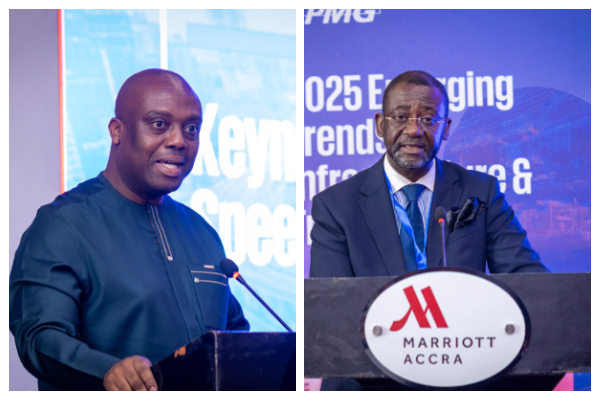Our Terms & Conditions | Our Privacy Policy
Ghana unveils ambitious infrastructure drive
Deputy Minister of Finance, Thomas Nyakon and Andrew Akoto
Ghana’s government has outlined an ambitious new infrastructure agenda, pledging to unlock private sector partnerships and scale up investments under President John Dramani Mahama’s Big Push Initiative.
The announcement came at the launch of KPMG’s Africa Infrastructure Advisory Practice in Ghana; a high-profile roadshow aimed at rethinking infrastructure financing and delivery.
Deputy Minister of Finance, Thomas Nyakon, delivering remarks on behalf of Finance Minister Dr Cassiel Ato Forson, said Ghana is embarking on a “Great Reset” of its economy, with infrastructure at the heart of national renewal.
“Quality infrastructure is the cornerstone upon which prosperous economies are built,” he said, stressing that roads, energy, irrigation and digital highways are not merely physical assets but “pathways to opportunity and connectivity.”
He acknowledged Ghana’s historical underinvestment in infrastructure, noting that the country’s infrastructure quality score of 47 out of 100 lags behind the average for lower middle-income countries.
The financing gap, estimated at 2.8% of GDP, far exceeds the regional average.
To tackle this deficit, the government has earmarked GH¢13.9 billion in 2025 for infrastructure investment, rising to GH¢21.2 billion by 2028, financed largely through petroleum revenues and mineral royalties.
“This is a remarkable shift, considering the fiscal consolidation programme we are pursuing to stabilise the distressed economy we inherited,” the Deputy Minister said.
Beyond funding, reforms to the Public Financial Management (PFM) system are being rolled out to curb arrears, enforce procurement discipline and guarantee value for money.
The government is also empowering the Ghana Infrastructure Investment Fund (GIIF) to structure special purpose vehicles that will attract private equity and development finance.
Given the scale of Ghana’s infrastructure needs estimated at US$37 billion annually over the next 30 years the government stressed that Public-Private Partnerships (PPPs) are indispensable.
“The public purse alone cannot do this. The fiscal space is tight. The demands are huge. The journey is long. PPPs are therefore not just desirable, they are indispensable,” Nyakon emphasised.
He assured that the administration is committed to addressing regulatory bottlenecks, strengthening risk governance and de-risking projects with credit enhancement mechanisms to attract private capital.
The event also marked the formal launch of KPMG’s Africa Infrastructure Advisory Practice in Ghana, a platform designed to provide integrated end-to-end support, from policy advisory to project structuring and financing.
KPMG Ghana’s Country Manager, Andrew Akoto, underscored that infrastructure is a “big bet” under the firm’s One Africa Strategy, with Ghana and Nigeria playing lead roles in West Africa.
“Infrastructure is foundational to unlocking Africa’s economic potential,” Akoto said, citing KPMG’s advisory roles on projects such as Kenya’s Nairobi Railway City Project and Nigeria’s Lagos Blue Line.
He also launched KPMG’s Emerging Trends in Infrastructure and Transport report, which highlights ten global shifts including digital transformation, asset monetisation and climate resilience that are directly relevant to Ghana’s development agenda.
Both government and KPMG urged stakeholders, investors, development finance institutions and the private sector to seize the moment.
“The framework is set. The vision is clear. The opportunities are vast: from energy and transport to digital infrastructure and urban development,” the Deputy Finance Minister said, calling for a legacy of shared prosperity.
“The time to reset is now. The challenges are real but so are the opportunities.”
Partner Africa Head of Transport and Infrastructure James Woodward stressed that infrastructure is one of the firm’s “big bets” under its One Africa Strategy.
“The time to reset is now. The challenges are real but so are the opportunities,” he said.
He urged stronger partnerships to bridge Ghana’s infrastructure financing gap.
Will Ghana pass the Anti-Witchcraft Bill? Find out in the latest episode of The Lowdown on GhanaWeb TV in this conversation with Amnesty International:
Images are for reference only.Images and contents gathered automatic from google or 3rd party sources.All rights on the images and contents are with their legal original owners.



Comments are closed.